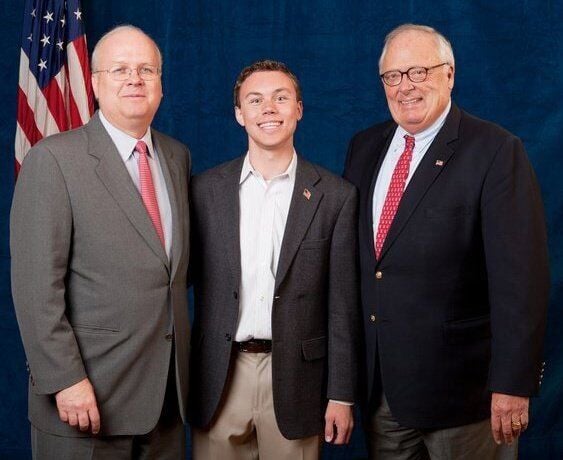RIP Ed Feulner — Regis-educated conservative pioneer | Jimmy Sengenbeger
It was early in the summer of 2010. Dr. Edwin J. Feulner returned to Regis University, his alma mater, for a board of trustees meeting. I was a student, eagerly waiting at our agreed meeting spot.
A few months earlier, he’d emailed me after reading a column I’d written in The Highlander campus newspaper about the Obamacare debate. He praised the piece, with a wink. Next time, I should quote one of his scholars instead of someone from the libertarian Cato Institute.
That’s when it hit me: This was the president and co-founder of The Heritage Foundation, the most influential conservative think tank in America.
On the day of our meeting, Feulner walked into the room. With a wide smile, he said simply: “So, what evil are you up to today, Jimmy?”
It was a witty callback to another column I’d written, sharing how then-Regis President Fr. Michael Sheeran, SJ, teasingly said that exact line to me at a family weekend breakfast. Feulner’s remark was instantly disarming.
When I learned the news that Feulner had passed away on Friday at 83, I couldn’t help but think of that moment and how this pillar of the modern conservative movement took time to engage with a young college student.
Feulner helped shape conservatism through decades of leadership at Heritage, by founding and guiding the House Republican Study Committee and more. Through it all, he championed the principles of conservatism — limited government, free enterprise, individual freedom, traditional American values and strong national defense.
Feulner keenly understood that, for conservative ideas to prosper, they must reach the public square. He ensured that Heritage trained policy staff to write, appear on camera and persuasively engage with policymakers and the media alike. “Ideas do have consequences,” he explained, “but only if they become part of the public policy dialogue.”
Heritage helped define the conservative agenda. Feulner’s name belongs alongside other influential conservative luminaries like William F. Buckley, Jr., Rush Limbaugh, Justice Antonin Scalia and President Ronald Reagan — who famously distributed Heritage’s “Mandate for Leadership” to every Cabinet member during their first meeting
Still, Feulner remained humble — a Washington heavyweight who always took the time to mentor and support the up-and-coming generations.
Months after our meeting, he invited me to attend and interview former Bush 43 advisor Karl Rove for my campus radio show at a Heritage event in Denver. It was a small gesture for Feulner but a formative moment for me — yet it seemed to echo his own conservative journey, which began at Regis.
Coming from a devout German Catholic family, Feulner wanted a Jesuit school that was “small and away.” The apolitical high-school grad chose Regis College over Loyola in his home city of Chicago.
“Regis College would introduce him to a world of ideas he did not know existed,” biographer Lee Edwards writes in “Leading the Way: The Story of Ed Feulner and the Heritage Foundation.”
When a history professor handed Feulner “Liberty or Equality” by Catholic writer and self-described classical liberal, Erik von Kuehnelt-Leddihn, it opened his eyes. “You’re either going to be in favor of liberty or you’re going to be in favor of equality,” he reflected in 1984, “and I realized at age eighteen that I favored liberty.”
He discovered Russell Kirk’s “The Conservative Mind” and F.A. Hayek’s “The Road to Serfdom.” Then came “The Conscience of a Conservative,” published in 1960 by Sen. Barry Goldwater.
As fate would have it, that exact same book connected us across time. As a student, I checked out a battered copy from the Regis library, and inside was the old checkout card. One name stood out: “E.J. Feulner.” Or maybe it was “Ed Fulner.” I’m not certain — I couldn’t find the book, which I got to keep — but he’d signed it around 1961. Feulner’s was apparently the only other name in the book’s checkout record in fifty years.
It was a quiet symbol of the intellectual roots of the modern conservative movement — one that left a lasting impression and underscored the rarity of such a spirit on college campuses.
As a Regis student in the Class of 1963, Feulner threw himself into campus life while forging conservative convictions. He helped lead Alpha Kappa Psi, the Literary Club and the Ranger Yearbook. He established Regis’s American Society chapter of the conservative Intercollegiate Society of Individualists, served in student government and was twice named “Regis Man of the Year.” Meanwhile, he worked in the mailroom, as a union stagehand at Denver Civic Theater and proofreader at Joslin’s Department Store.
As news editor and columnist for the Brown and Gold Review student newspaper, Feulner cut his teeth in rhetorical persuasion — frequently tackling global issues, Edwards recounts, like endorsing an end to U.S. foreign aid to “neutral” nations that opposed freedom and free enterprise. He toured Western Europe in 1961 with fellow students but missed Berlin on his birthday because the Soviets had started building the Wall.
In the end, it’s hard not to marvel at the irony: a Jesuit university, not known for conservative orthodoxy, launched one of the most consequential conservatives of the past century.
Regis may not have intended to nurture a mind that helped shape modern conservatism, but it did — proving the right ideas, once sparked, will catch fire.
That’s the story of Ed Feulner. His legacy lives on, and his work continues. As he always signed off, with deep conviction and infectious optimism: “Onward and upward!”
Jimmy Sengenberger is an investigative journalist, public speaker, and longtime local talk-radio host. Reach Jimmy online at Jimmysengenberger.com or on X (formerly Twitter) @SengCenter.
Jimmy Sengenberger is an investigative journalist, public speaker, and longtime local talk-radio host. Reach Jimmy online at Jimmysengenberger.com or on X (formerly Twitter) @SengCenter.






